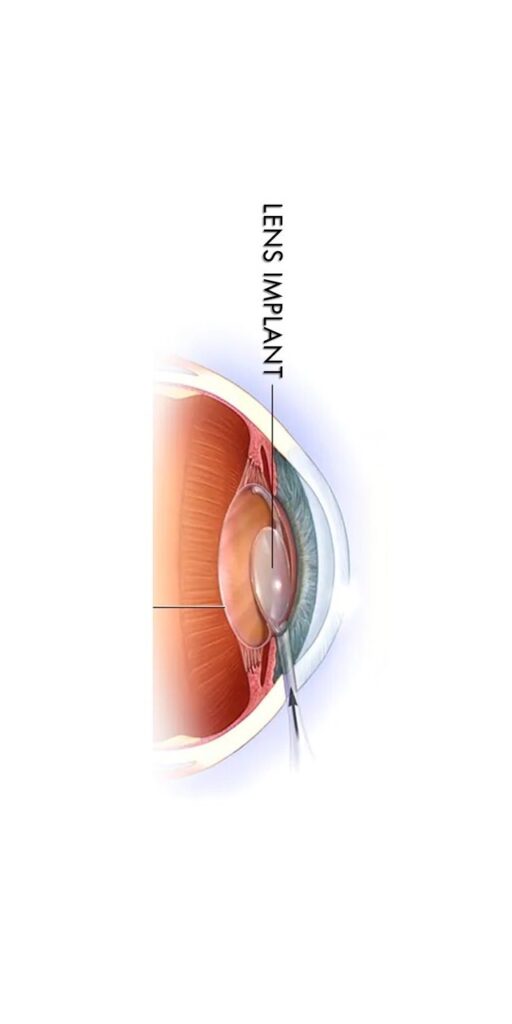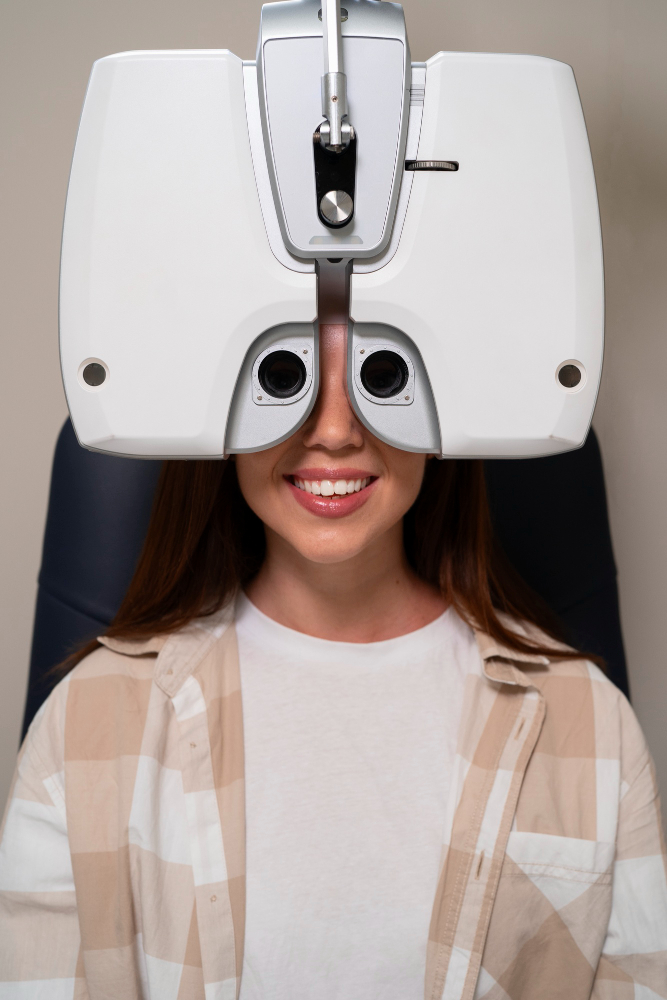Lens Implantation
Lens Implantation for Vision Correction
Lens implantation for vision correction is a surgical procedure aimed at improving vision and reducing dependence on glasses or contact lenses. The process involves inserting an artificial lens inside the eye, usually under local anesthesia. This procedure serves as an alternative to other vision correction surgeries like LASIK and is suitable for individuals with myopia, hyperopia, or astigmatism, especially those who are not eligible for other procedures. This method is characterized by rapid recovery and precise outcomes, but it requires a thorough evaluation of the eye’s health and a comprehensive discussion of risks and benefits with the treating physician.
Types of Eye Lens Implantation Surgeries
The types of lens implantation surgeries vary depending on the lens used and the patient’s medical condition. The most prominent types include:
Monofocal IOLs: Provide clear vision at one distance, either near or far, but may require glasses for reading.
Multifocal IOLs: Offer the ability to see objects at various distances without glasses.
Toric IOLs: Designed to correct astigmatism.
Adjustable IOLs: Allow for post-surgical adjustment of optical power.
Implantable Collamer Lenses (ICL): Placed without removing the natural lens, used to correct high degrees of myopia.

Implantable Collamer Lenses (ICL) are used to correct high levels of myopia and astigmatism. These lenses are made from eye-friendly materials and do not require the removal of the natural lens. They are placed between the cornea and the natural lens, and are removable if necessary. ICLs provide sharp and clear vision and are an excellent alternative for individuals who cannot undergo laser vision correction due to corneal thickness or high refractive errors.
Intraocular lens implantation is performed through a precise surgical procedure under local anesthesia. The procedure starts with a small incision in the eye, through which the folded lens is inserted. Inside the eye, the lens is unfolded and positioned correctly, either behind the iris or between the cornea and the natural lens. The surgery requires high skill and precision, and the recovery period is usually quick. The surgical incision is closed without the need for stitches in most cases, and patients can typically return to most of their daily activities within a few days.
Ideal candidates for lens implantation are individuals with high degrees of myopia, hyperopia, or astigmatism, whose vision cannot be effectively corrected with glasses or contact lenses. They should have healthy eyes without significant diseases affecting the cornea or retina. The patient should be over 21 years old, where vision has stabilized. Patients should not have a history of severe dry eye or other eye conditions that could complicate the procedure.
Advantages of Lens Implantation
Lens implantation offers several advantages that make it an attractive option for many people with vision problems. Firstly, it provides a permanent solution for vision correction, reducing the reliance on glasses or contact lenses. Secondly, it can correct a wide range of vision problems, including myopia, hyperopia, and astigmatism. Thirdly, lens implantation is safe and effective, carrying relatively low risks compared to other vision correction procedures. Fourthly, the procedure has a relatively quick recovery period, allowing patients to resume their daily activities within a few days. Fifthly, it significantly improves the quality of vision, with many patients reporting high satisfaction after the surgery.
Disadvantages of Lens Implantation
Despite its many advantages, there are some drawbacks to lens implantation to consider. Firstly, the cost of the surgery can be high and is not always covered by health insurance. Secondly, like any surgical procedure, lens implantation carries certain risks such as infection, inflammation, and vision haze. Thirdly, the procedure may not provide complete vision correction, and some patients may need glasses for certain activities like reading. Fourthly, some patients may experience issues like glare or halos around lights. Fifthly, in some cases, adjustments or additional surgeries may be required.

Steps of Lens Implantation Surgery for Vision Correction
Lens implantation surgery involves several important steps. The first step is a comprehensive eye health assessment, where the doctor examines the eye and determines the best type of lens. The second step is preparing the patient for surgery, which includes precise eye measurements to ensure the lens fits properly. The third step is the surgical procedure itself, where a small incision is made in the eye to implant the lens. The fourth step involves placing the selected lens inside the eye. The fifth step includes closing the surgical incision, usually without the need for stitches. The sixth step is the recovery phase, where the patient follows the doctor’s post-surgery care instructions.
Conditions Necessitating Lens Implantation Surgery
Several conditions warrant considering lens implantation surgery. These include patients with high degrees of myopia, hyperopia, or astigmatism that cannot be sufficiently corrected with glasses or contact lenses. It’s also an option for people with conditions like cataracts that require replacing the eye’s natural lens. Additionally, it can be considered for those with medical conditions that make contact lenses or glasses an uncomfortable or impractical option.
When Does Vision Improve After Lens Implantation Surgery?
Vision improvement after lens implantation surgery can be noticeable quite quickly, sometimes within a few hours after the procedure. However, it may take several days to weeks for vision to fully stabilize. During this time, patients may notice changes in vision, which is normal as part of the healing process. It’s important for patients to follow the doctor’s recommendations and attend all follow-up appointments to monitor progress.
Post-Implantation Lens Care Tips
Rest After Surgery: Immediately after lens implantation surgery, it’s essential to take some time to rest. Avoid strenuous activities and visual strain during the first few days post-surgery. This means avoiding reading books or using electronic devices for extended periods.
Light Protection: Eyes may be sensitive to light after the surgery, so wearing sunglasses when outdoors is recommended for several weeks post-operation.
Avoid Direct Eye Contact: It’s important to avoid rubbing or pressing the eyes, as this could cause the implanted lens to move or cause damage.
Use Prescribed Eye Drops: Doctors typically prescribe eye drops to prevent infection and reduce inflammation. It’s crucial to follow the doctor’s instructions precisely regarding how and when to use these drops.
Follow Up with Your Doctor: Attending all post-surgery appointments with your doctor is vital to monitor recovery and observe any changes.
Avoid Water Activities: Swimming, diving, and other water activities should be avoided for several weeks to prevent infection.
Manage Pain and Discomfort: Some pain or discomfort may be experienced after the surgery. In such cases, it’s important to communicate with your doctor, who may prescribe pain relievers if necessary.
Maintain a Healthy Diet and Hydration: Eating a healthy diet and drinking plenty of fluids can help the body recover faster.
Protect from Injuries: It’s advised to avoid activities that may expose the eyes to the risk of injury, such as contact sports, for several weeks post-operation.
Comfortable Sleeping: You may be advised to wear an eye shield while sleeping to prevent putting pressure on the eye or inadvertently rubbing it during sleep.
Working Hours
Saturday
7 pm to 9 pm
Sunday
7 pm to 9 pm
Monday
7 pm to 9 pm
Tuesday
7 pm to 9 pm
Wednesday
7 pm to 9 pm
Thursday
Closed
Friday
Closed
Ramadan Working Hours
Saturday to Wednesday from 9 pm to 11 pm
Location
21st Ismail Ramzy st. – El-Bostan – Heliopolis – 4th floor
01110114354
01222422637
0226331026
(7 pm to 9 pm)
Make Appointment
Always happy to receive your inquiries
